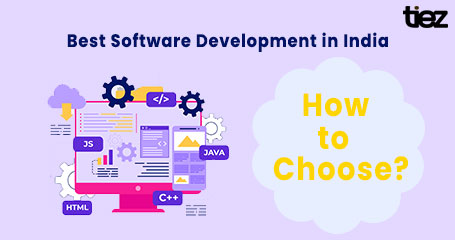India has emerged as a leading force in the global software development landscape. Its vast pool of skilled professionals, combined with cost-effective solutions and strong communication skills, makes it an attractive destination for businesses seeking reliable development partners. However, with a multitude of companies vying for your attention, choosing the right one can be a daunting task. This blog will guide you through the key criteria and steps involved in finding a reputable software development company in India.
Why Choose India for Software Development?
Several factors contribute to India’s prominence in the software development industry:
- High-Quality Talent Pool: India boasts a large pool of highly skilled engineers and developers proficient in various technologies. Top universities churn out graduates well-versed in the latest programming languages and frameworks.
- Cost-Effective Solutions: Compared to western markets, India offers competitive development rates. This can be particularly beneficial for startups and budget-conscious businesses looking for software development services in mumbai.
- Proficiency in English and Communication Skills: English is widely spoken in India, facilitating seamless communication and collaboration. This ensures a clear understanding of project requirements and efficient development processes.
- Time Zone Advantages: India’s time zone offers some overlap with western countries, allowing for more streamlined communication and project management.
Key Criteria for Selecting a Software Development Company in India
With a clear understanding of India’s advantages, let’s delve into the critical factors to consider when choosing a development partner:
- Experience and Expertise: Look for a company with a proven track record of success in your industry or a similar domain. A strong portfolio of completed projects demonstrates their capabilities and experience. Consider companies specializing in software development services in India if that’s your primary focus.
- Domain Expertise: Choose a company familiar with the specific challenges and requirements of your industry. This allows them to leverage their existing knowledge and deliver tailored solutions.
- Technology Stack Proficiency: Ensure the company possesses expertise in the technologies required for your project. Analyze their portfolio and team profiles to assess their technical skillset.
Review the Company’s Past Projects
A company’s portfolio is a valuable tool for understanding its capabilities. Look for projects that demonstrate their experience with similar projects to yours. Here are some resources to explore:
Portfolio and Case Studies: The company website should showcase a detailed portfolio of past projects. Case studies offer a deeper dive into their approach, challenges tackled, and successful outcomes.
Client Reviews and Testimonials
Client testimonials and reviews on independent platforms offer valuable insights into the company’s performance and customer satisfaction. Reliable platforms include:
- Clutch: Provides verified client reviews for B2B service providers.
- Good Firms: A platform for identifying reputable IT companies based on user reviews and project listings.
- Google Reviews: Independent reviews on Google My Business can provide additional insights.
Technical Skills and Certifications
A skilled and up-to-date development team is crucial for project success. Look for companies that invest in their team’s continuous learning and maintain relevant industry certifications.
Clear Communication Channels
Effective communication is vital for smooth project execution. Ensure the company has established communication protocols and dedicated points of contact for your project.
Scalability and Flexibility
Choose a company that can adapt to your project’s evolving needs. Consider their ability to scale the development team up or down as your project progresses.
Cost and Value for Money
Development costs in India are generally lower than in some western markets. However, always consider the value proposition.
- Pricing Models: Understand the company’s pricing models (fixed price vs. hourly rates) and ensure it aligns with your budget and project scope.
- Value for Money: Look beyond just cost. Prioritize companies that deliver high-quality solutions and prioritize transparent communication.
Red Flags to Watch Out For
While India offers a wealth of development talent, be cautious of certain red flags:
- Lack of Transparency: A reputable company will be upfront about their capabilities, methodologies, and pricing.
- Poor Communication: Difficulty in establishing clear communication channels can lead to misunderstandings and project delays.
- Overpromising and Underdelivering: Companies promising unrealistic timelines or functionalities are likely setting you up for disappointment.
- Lack of Post-Deployment Support: Reliable ongoing support is crucial for ensuring your software’s long-term success. Choose a company offering comprehensive post-deployment support services.
Steps to Engage with a Software Development Company
Once you’ve identified potential partners, take the following steps to build a successful partnership:
1. Initial Consultation
Schedule an initial consultation to discuss your project requirements in detail. This allows you to understand the company’s approach, methodologies, and team structure.
2. Request for Proposal (RFP) and Quotation
Prepare a detailed RFP outlining your project scope, functionalities, and expected timeline. This document serves as a roadmap for potential partners and ensures everyone is on the same page. Here are key elements to include in your RFP:
- Project Overview: Briefly introduce your company and provide a high-level overview of the project’s purpose and objectives.
- Detailed Functionality Breakdown: Outline the specific features and functionalities you envision for your software. This could include user stories, wireframes, or mockups if available.
- Technical Requirements: Specify any preferred programming languages, frameworks, or technologies critical for your project. Mention if you’re looking for a company with expertise in a particular area, like software development services in Mumbai that specialize in mobile app development.
- Project Timeline and Milestones: Define a realistic timeline for project completion and break it down into achievable milestones.
- Budget: While confidentiality is important, provide a general budget range to help companies tailor their proposals.
- Selection Criteria: Outline the criteria you will use to evaluate proposals and select the most suitable partner. This could include technical capabilities, experience, communication style, and cost.
Once you’ve finalized the RFP, distribute it to shortlisted companies and request formal quotations. Look beyond just the price when evaluating proposals. Consider the following:
- Understanding of Your Needs: Does the proposal demonstrate a clear understanding of your project requirements?
- Proposed Approach and Methodology: How does the company plan to approach development? Does their methodology align with your expectations?
- Team Composition: Does the team possess the necessary skills and experience to successfully deliver your project? Consider if their expertise aligns with your search for best software development company in Mumbai or software development services in India, depending on your needs.
- Cost Breakdown: Does the cost breakdown detail the charges associated with different project phases?
- Communication Strategy: How does the company plan to communicate with you throughout the development process?
3. Evaluation and Shortlisting
After receiving proposals, carefully evaluate each one based on your defined selection criteria. Here are some tips for a thorough evaluation:
- Schedule follow-up calls: Address any questions or clarifications you may have with each shortlisted company.
- Compare proposals side-by-side: Create a comparison table to analyze key aspects of each proposal.
- Team Evaluation: Shortlist companies whose teams demonstrate the necessary technical skillset and relevant experience. Pay close attention to whether their experience aligns with your search for a software development company in mumbai or a broader software development company in india.
- Communication Style: Prioritize companies that exhibit clear and concise communication during the proposal process.
4. Final Decision and Contract Signing
Once you’ve shortlisted a few top contenders, schedule in-person meetings (or video calls) for further discussions. This allows you to get a better feel for the company culture and team dynamics.
Choose the development partner you feel most confident with based on their expertise, communication style, and ability to meet your project needs.
Before signing any contracts, ensure all terms and conditions are clear and well-defined. This includes:
- Project Scope: Clearly define the scope of work, functionalities included, and expected deliverables.
- Development Milestones: Outline project milestones with corresponding deadlines.
- Payment Terms: Specify payment schedules and methods.
- Intellectual Property (IP) Rights: Ensure ownership of the developed software rests with your company.
- Dispute Resolution: Establish a process for resolving any potential disagreements during the development process.
By following these steps and conducting thorough due diligence, you can increase your chances of finding a reputable software development company in India that aligns perfectly with your project needs. Remember, a successful partnership hinges on open communication, a shared vision, and a commitment to delivering high-quality work.
Conclusion
Finding the right software development partner in India requires careful consideration. By capitalizing on India’s skilled workforce and cost-effective solutions, you can unlock significant advantages for your software development project. Utilize the key criteria outlined here to navigate the selection process and establish a strong foundation for a successful and rewarding collaboration.




